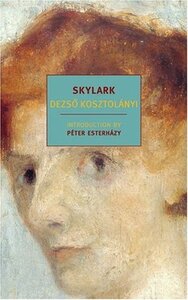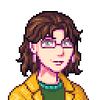Take a photo of a barcode or cover
emotional
reflective
sad
medium-paced
Plot or Character Driven:
Character
Strong character development:
Complicated
Loveable characters:
Yes
Diverse cast of characters:
No
Flaws of characters a main focus:
Yes
lighthearted
reflective
slow-paced
Plot or Character Driven:
Character
Strong character development:
N/A
Loveable characters:
Yes
Diverse cast of characters:
No
Flaws of characters a main focus:
Yes
reflective
sad
slow-paced
Az első 60 oldal megríkatott, olyan nehezen ment, utána könnyebben emészthető. Ez volt az első Kosztolányi-mű, amit olvastam, de kicsit többre számítottam az őt övező tiszetelet és csodálat miatt.
To be completely superficial let me start by saying that for a book concerning ugliness, this has a beautiful cover. The colors are gorgeous and fine -dark ochre and robin's egg blue- and the sans serif type and Hungarian accents top it off like fragile bones.
But looks aren't everything. I was also bowled over by the story, which is both heartbreaking and very funny. It's set in a distinctive time and place, but what's portrayed is accessible to anyone.
Before going into it, it’s important to know that this book has a lot of laughs. I laughed out loud at the theater scene. I laughed at how the writer poked fun at the characters’ sentimentality. I laughed at the drunken “ride” in the chair, at the father’s confrontation with a man he’d hoped would wed his daughter, the funny title headings, and at many exchanges between the couple. It’s the humorous touch and the irony that makes it surprising how sad this book is.
The story is about a couple and their 35-year old unmarried daughter, Skylark, who is their life's focus and its albatross. Because Skylark suffers, they suffer. Because Skylark has no way to escape her sad, uneventful life, they resolve to a sad and uneventful life, cutting themselves off from the community and friends and everything else that brings sensual or intellectual pleasure - the theater, good food, cigars, music.
This self-imposed deprivation is painful for the characters, but tedium in its sameness is a great soother, and the alternative would throw Skylark's situation into stark relief. That's what happens when she goes away for a week to visit relatives, leaving her parents alone. They loosen up, and the thought of Skylark loses its grip, until they are confronted with her return.
Skylark seems an average, able person; unfortunately she lacks any gifts, talent or any particular characteristic that would make her attractive, or enrich her inner life, like a keen mind or a love of music, say, or poetry. Significantly the father’s only pastime is studying genealogy, as his own family tree is about to stop branching.
Skylark’s ugliness comes across almost as a disability, as when we first encounter her in the garden in the posture that is “best” for her, or when she walks flanked by her parents. Although she never really seeks to manipulate anyone, Skylark’s presence is oppressive. The family doesn’t eat in restaurants because she has a sensitive stomach. Her frugality means they use only one bulb in a four-bulb chandelier. Her parents love her dotingly in an effort to ease her loneliness, and they hate her because they are powerless to change it.
But looks aren't everything. I was also bowled over by the story, which is both heartbreaking and very funny. It's set in a distinctive time and place, but what's portrayed is accessible to anyone.
Before going into it, it’s important to know that this book has a lot of laughs. I laughed out loud at the theater scene. I laughed at how the writer poked fun at the characters’ sentimentality. I laughed at the drunken “ride” in the chair, at the father’s confrontation with a man he’d hoped would wed his daughter, the funny title headings, and at many exchanges between the couple. It’s the humorous touch and the irony that makes it surprising how sad this book is.
The story is about a couple and their 35-year old unmarried daughter, Skylark, who is their life's focus and its albatross. Because Skylark suffers, they suffer. Because Skylark has no way to escape her sad, uneventful life, they resolve to a sad and uneventful life, cutting themselves off from the community and friends and everything else that brings sensual or intellectual pleasure - the theater, good food, cigars, music.
This self-imposed deprivation is painful for the characters, but tedium in its sameness is a great soother, and the alternative would throw Skylark's situation into stark relief. That's what happens when she goes away for a week to visit relatives, leaving her parents alone. They loosen up, and the thought of Skylark loses its grip, until they are confronted with her return.
Skylark seems an average, able person; unfortunately she lacks any gifts, talent or any particular characteristic that would make her attractive, or enrich her inner life, like a keen mind or a love of music, say, or poetry. Significantly the father’s only pastime is studying genealogy, as his own family tree is about to stop branching.
Skylark’s ugliness comes across almost as a disability, as when we first encounter her in the garden in the posture that is “best” for her, or when she walks flanked by her parents. Although she never really seeks to manipulate anyone, Skylark’s presence is oppressive. The family doesn’t eat in restaurants because she has a sensitive stomach. Her frugality means they use only one bulb in a four-bulb chandelier. Her parents love her dotingly in an effort to ease her loneliness, and they hate her because they are powerless to change it.
The humor of this book was just my speed. I didn't expect to laugh as often as I did, but I also enjoyed the moments of melancholy.
A fairly decent book, and I ended up enjoying it more than I thought I would. Fascinating look into the way banality seeps into our lives, and how we adjust and rationalize it. In reading the book plainly, you would think Skylark is the cause of the banality in the parents lives, but that could not be further from the truth. The truth is the parents are complicit in their own banality in their treatment of Skylark, and in the end, the reader has to question who is really the suffocating presence in the relationship, or if, they are all suffocating each other.
emotional
funny
medium-paced
Plot or Character Driven:
Character
Loveable characters:
Yes
Flaws of characters a main focus:
Yes
reflective
sad
slow-paced
Plot or Character Driven:
Character
Strong character development:
Complicated
Loveable characters:
Complicated
Flaws of characters a main focus:
Yes
Plot or Character Driven:
Character
Strong character development:
No
this is a great book about the burden of suffering and heartbreak surrounding family
it focuses on everyday life, of the suffering and conflicts of each relatives feelings, all centred around skylark.
with her parents remembering there’s a world outside of their house and her, her other relatives ignoring and being annoyed by her, and the town ignoring her - she’s described as ugly and old, with nothing going for her ( no husband, children, friends - just her parents ) and we see the toll that it takes on her parents but especially on her.
this book is just written so well and concise.
it focuses on everyday life, of the suffering and conflicts of each relatives feelings, all centred around skylark.
with her parents remembering there’s a world outside of their house and her, her other relatives ignoring and being annoyed by her, and the town ignoring her - she’s described as ugly and old, with nothing going for her ( no husband, children, friends - just her parents ) and we see the toll that it takes on her parents but especially on her.
this book is just written so well and concise.
Piano piano, la letteratura ungherese si sta conquistando un posto d'onore nella mia libreria.
Allodola è il soprannome, inadatto, di una figlia troppo brutta per trovare marito, in un'epoca in cui l'essere zitella può ancora considerarsi un problema. Allodola è figlia unica, vive in casa coi genitori. Col tempo il loro rapporto è diventato insano e il nucleo famigliare si è barricato in casa. Non è chiaro chi stia proteggendo chi dal resto del mondo, ma non c'è tempo per riflessioni raffinate nella routine giornaliera. Per i genitori la poverina è Allodola, signorina trentacinquenne, e per la figlia i poverini sono i genitori, che tenta di tutelare con una vita blanda come i cibi che cucina loro. Non vivono, ma si camminano attorno in punta di piedi.
Poi lo shock: Allodola viene invitata in campagna dai parenti. Non si può rifiutare, la separazione è inevitabile. Ci sarà una settimana, un'intera settimana in cui abbandonare forzatamente il conforto delle abitudini.
Credevo avremmo seguito l'Allodola, invece dalla stazione torniamo a casa con Akos e Antonia. Lo sconcerto dei due anziani è palpabile. Per 35 anni hanno vissuto solo per la figlia e la casa, ora che sono soli, sembra quasi un paesaggio alieno. Inoltre Allodola ha preso in mano le redini delle faccende domestiche, e soprattutto della cucina, per cui i genitori si trovano a fare l'impensabile: andare al ristorante per mangiare.
Sì, la nostra coppia è costretta ad uscire di casa e a riprendere quella vita mondana che avevano abbandonato per proteggere la figlia, dagli scorni della società. I due anziani rinascono: vecchi amici e nuove conoscenze fanno a gara per passare del tempo con loro, e i signori sembrano gradire. Man mano che si avvicina il ritorno della figlia sale l'angoscia, la sensazione di vivere una vita rubata, di partecipare a una farsa. O forse la recita è quella che hanno fatto finora, quotidianamente, a beneficio delle sole quattro mura di casa? E Allodola, dagli zii, non prova forse le stesse sensazioni? Come si sono cementati questi obblighi famigliari così grigi, così secchi? C'è veramente bisogno di fare tanta economia? C'è veramente bisogno di mangiare carne e riso, senza nemmeno (e vi ricordo che siamo in Ungheria) un po' di paprika?
Non so se la parika mancante nei pasti di famiglia voglia essere effettivamente una metafora, ma il gusto è un senso importante ai fini della storia. Akos, il padre, non può più bere e fumare, come prescritto dal medico, e vorrebbe almeno che le sue pietanze fossero saporite, ma l'austerità di Allodola rassenta l'avarizia e persino le spezie sono bandite.
Il romanzo, come dice l'autore, si conclude, ma non termina. Una settimana passa in fretta e quando questa famiglia disfunzionale si trova riunita i meccanismi insani della loro convivenza riprendono, come se mai fossero stati interrotti. L'incapacità di comunicare apertamente i propri desideri li affossa in ruoli che tutti detestano. Allodola piange. I suoi genitori hanno già pianto il giorno prima, quando il padre si è sentito troppo in colpa per le libertà presesi e ha finalmente avuto il coraggio di parlare con la moglie. La signora sembra più razionale, o forse semplicemente conosce le parole che il marito ha bisogno di sentirsi dire. In ogni caso il risultato non cambia: la porta si è chiusa di nuovo, nella casetta a un piano di via Petöfi.
Allodola è il soprannome, inadatto, di una figlia troppo brutta per trovare marito, in un'epoca in cui l'essere zitella può ancora considerarsi un problema. Allodola è figlia unica, vive in casa coi genitori. Col tempo il loro rapporto è diventato insano e il nucleo famigliare si è barricato in casa. Non è chiaro chi stia proteggendo chi dal resto del mondo, ma non c'è tempo per riflessioni raffinate nella routine giornaliera. Per i genitori la poverina è Allodola, signorina trentacinquenne, e per la figlia i poverini sono i genitori, che tenta di tutelare con una vita blanda come i cibi che cucina loro. Non vivono, ma si camminano attorno in punta di piedi.
Poi lo shock: Allodola viene invitata in campagna dai parenti. Non si può rifiutare, la separazione è inevitabile. Ci sarà una settimana, un'intera settimana in cui abbandonare forzatamente il conforto delle abitudini.
Credevo avremmo seguito l'Allodola, invece dalla stazione torniamo a casa con Akos e Antonia. Lo sconcerto dei due anziani è palpabile. Per 35 anni hanno vissuto solo per la figlia e la casa, ora che sono soli, sembra quasi un paesaggio alieno. Inoltre Allodola ha preso in mano le redini delle faccende domestiche, e soprattutto della cucina, per cui i genitori si trovano a fare l'impensabile: andare al ristorante per mangiare.
Sì, la nostra coppia è costretta ad uscire di casa e a riprendere quella vita mondana che avevano abbandonato per proteggere la figlia, dagli scorni della società. I due anziani rinascono: vecchi amici e nuove conoscenze fanno a gara per passare del tempo con loro, e i signori sembrano gradire. Man mano che si avvicina il ritorno della figlia sale l'angoscia, la sensazione di vivere una vita rubata, di partecipare a una farsa. O forse la recita è quella che hanno fatto finora, quotidianamente, a beneficio delle sole quattro mura di casa? E Allodola, dagli zii, non prova forse le stesse sensazioni? Come si sono cementati questi obblighi famigliari così grigi, così secchi? C'è veramente bisogno di fare tanta economia? C'è veramente bisogno di mangiare carne e riso, senza nemmeno (e vi ricordo che siamo in Ungheria) un po' di paprika?
Non so se la parika mancante nei pasti di famiglia voglia essere effettivamente una metafora, ma il gusto è un senso importante ai fini della storia. Akos, il padre, non può più bere e fumare, come prescritto dal medico, e vorrebbe almeno che le sue pietanze fossero saporite, ma l'austerità di Allodola rassenta l'avarizia e persino le spezie sono bandite.
Il romanzo, come dice l'autore, si conclude, ma non termina. Una settimana passa in fretta e quando questa famiglia disfunzionale si trova riunita i meccanismi insani della loro convivenza riprendono, come se mai fossero stati interrotti. L'incapacità di comunicare apertamente i propri desideri li affossa in ruoli che tutti detestano. Allodola piange. I suoi genitori hanno già pianto il giorno prima, quando il padre si è sentito troppo in colpa per le libertà presesi e ha finalmente avuto il coraggio di parlare con la moglie. La signora sembra più razionale, o forse semplicemente conosce le parole che il marito ha bisogno di sentirsi dire. In ogni caso il risultato non cambia: la porta si è chiusa di nuovo, nella casetta a un piano di via Petöfi.






